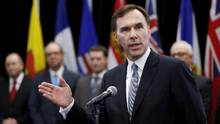Finance Minister Bill Morneau walked into a meeting on the upcoming federal budget with Calgary energy industry executives and other business leaders about the same time as the price of crude hit a new low point on Friday.
“It was frank, and people expressed real concerns about the current state of the economy in Alberta,” Mr. Morneau told reporters.
He arrived in the city as part of his cross-country prebudget tour on the gloomiest week of the new year: Crude prices dropped to a 12-year low, real estate agents told of worried homeowners listing their houses with the purpose of exiting a market in decline, ATB Financial predicted a second year of recession in the province and the government of British Columbia announced it would not support the expansion of a pipeline to carry Alberta heavy oil to the West Coast.
The minister tried to bring some reassurance to the worried city as he met with everyone from the owner of a local brewery to renewable-energy proponents to Calgary Mayor Naheed Nenshi, who discussed shovel-ready infrastructure projects he hopes will get some of the money Ottawa plans to spend in economic stimulus. “In cases where we can find prudent and responsible projects that we can embark on quickly, we will do so,” Mr. Morneau later said.
He also appeared to leave the door open to some type of extension to the eligibility period for employment-insurance benefits for Albertans who have lost their jobs and been unable to find new ones after months of searching. “We will be thinking about all sorts of policy measures that we can take in order to improve the situation.”
But pipelines, the most crucial part of what is called “market access” in the industry, were a key issue. Even with low oil prices, Canada’s oil and gas industry is still pushing to find new international markets. This is because it is almost entirely dependent for its sales on the United States – where Canadian oil is often sold for significantly less than the West Texas intermediate (WTI) benchmark price.
For instance, while WTI plunged to below $30 (U.S.) a barrel on Friday, Western Canadian select – the price of a blend of conventional Canadian heavy oil and bitumen from the oil sands – dropped to about $15 a barrel.
“There’s clearly a worry among people in the sector that they do need to find a way to get access to tidewater,” Mr. Morneau said.
With the boom in shale oil and natural gas production over the past several years, the United States does not need Canadian energy exports as badly as it once did. Alberta Premier Rachel Notley said this week that the United States has “transformed from our best customer to our biggest competitor.”
In a city that has historically supported conservative parties rather than the Liberals, there was some optimism that the minister has grasped the seriousness of the predicament – as energy leaders see it.
“I think our government in Ottawa really understands the crisis we’re in,” said Alex Ferguson, a vice-president of the Canadian Association of Petroleum Producers, who met with Mr. Morneau on Friday morning.
There are two key projects for the oil industry: Kinder Morgan’s proposed expansion of its Trans Mountain pipeline, which runs from east of Edmonton to Burnaby, B.C., that would nearly triple the conduit’s total capacity to 890,000 barrels a day; and TransCanada Corp.’s Energy East pipeline project, a $15.7-billion (Canadian), 4,500-kilometre route from Alberta to Saint John.
The oil industry sees both as crucial links for moving landlocked Alberta crude to global markets, especially since U.S. President Barack Obama rejected TransCanada’s $8-billion (U.S.) Keystone XL pipeline last year. However, earlier this week, the British Columbia government said it cannot support Kinder Morgan’s expansion project because the company is not offering sufficient details of its spill-response plans.
During a meeting at the Calgary Chamber of Commerce, Mr. Morneau heard a particular concern about a Liberal policy promise to phase out subsidies for the fossil-fuel industry – some of which the energy industry considers simply tax breaks to which other sectors also have access. Some participants asked for the tax treatment of the energy industry to remain as it is.
Mr. Morneau was also questioned by University of Calgary political science student Caitlyn Madlener, who said it is unfair Alberta will still contribute to Canada’s equalization system this year, when it faces such a serious economic downturn.
ECONOMY
Morneau seeks to calm jittery energy executives in Calgary
























Laissez un commentaire Votre adresse courriel ne sera pas publiée.
Veuillez vous connecter afin de laisser un commentaire.
Aucun commentaire trouvé